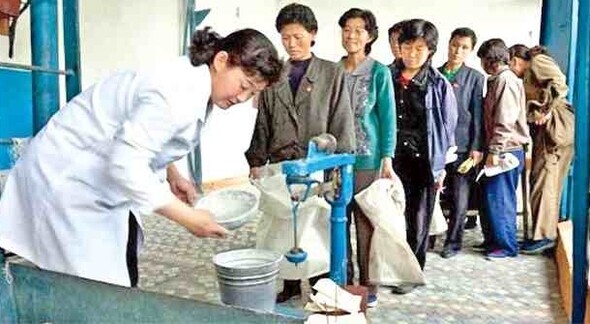hankyoreh
Links to other country sites 다른 나라 사이트 링크
South Korean life expectancy 11 years longer than North Korean

South and North Koreans differ in average life expectancy by over 11 years, a recent study shows.
A report on the “Status and Prospects for Chief South and North Korean Health Indicators in Light of the German Reunification Example” by researcher Cho Kyung-sook of the OECD Korea Policy Centre was published on Nov. 3 in by the Korea Institute for Health and Social Affairs (KIHASA). In it, the average life expectancy for South Koreans as of 2015 was given as 84.6 years for women and 78 years for men. The numbers were respectively 11.3 and 11.7 years higher than the North Korean life expectancies of 73.3 and 66.3 years.
Average life expectancies between South and North Koreans first began differing sharply in the 1990s. As of 1965, the average South Korean woman’s life expectancy was 57.6 years, or three years longer than the 54.6 average for North Korean women. The gap subsequently narrowed before opening again to 3.3 years in 1990. Recently, it has risen to 11.3 years. For men, the South Korean average for 1965 was 52.3 years, or 3.9 years higher than the 48.4 for North Korean men. That gap continued to grow in later years, reaching 11.8 years in 2000 and 11.7 last year.
The gap in average South and North Korean life expectancies is likely to continue growing. Analysis of figures from Statistics Korea and North Korean statistics showed South Korean women’s average life expectancy predicted to rise to 87.7 in 2030, 89.3 in 2040, 90.7 in 2050, and 92.1 in 2060. The average for North Korean women was also predicted to rise - to 76.7, 78.5, 80.1, and 81.6 years, respectively - but with no signs of the ten-year gap narrowing.
“The gap in South and North Korean average life expectancies is much larger than for East and West Germany before reunification,” said Cho in the report.
“Even if reunification occurs, the gap is not expected close for some time,” she added.
By Kim Yang-joong, medical correspondent
Please direct questions or comments to [english@hani.co.kr]

Editorial・opinion
![[Column] Park Geun-hye déjà vu in Yoon Suk-yeol [Column] Park Geun-hye déjà vu in Yoon Suk-yeol](https://flexible.img.hani.co.kr/flexible/normal/500/300/imgdb/original/2024/0424/651713945113788.jpg) [Column] Park Geun-hye déjà vu in Yoon Suk-yeol
[Column] Park Geun-hye déjà vu in Yoon Suk-yeol![[Editorial] New weight of N. Korea’s nuclear threats makes dialogue all the more urgent [Editorial] New weight of N. Korea’s nuclear threats makes dialogue all the more urgent](https://flexible.img.hani.co.kr/flexible/normal/500/300/imgdb/original/2024/0424/7317139454662664.jpg) [Editorial] New weight of N. Korea’s nuclear threats makes dialogue all the more urgent
[Editorial] New weight of N. Korea’s nuclear threats makes dialogue all the more urgent- [Guest essay] The real reason Korea’s new right wants to dub Rhee a founding father
- [Column] ‘Choson’: Is it time we start referring to N. Korea in its own terms?
- [Editorial] Japan’s rewriting of history with Korea has gone too far
- [Column] The president’s questionable capacity for dialogue
- [Column] Are chaebol firms just pizza pies for families to divvy up as they please?
- [Column] Has Korea, too, crossed the Rubicon on China?
- [Correspondent’s column] In Japan’s alliance with US, echoes of its past alliances with UK
- [Editorial] Does Yoon think the Korean public is wrong?
Most viewed articles
- 1‘We must say no’: Seoul defense chief on Korean, USFK involvement in hypothetical Taiwan crisis
- 2Will NewJeans end up collateral damage in internal feud at K-pop juggernaut Hybe?
- 3[Column] Park Geun-hye déjà vu in Yoon Suk-yeol
- 4Why Korea shouldn’t welcome Japan’s newly beefed up defense cooperation with US
- 5Thursday to mark start of resignations by senior doctors amid standoff with government
- 6N. Korean hackers breached 10 defense contractors in South for months, police say
- 7[Guest essay] The real reason Korea’s new right wants to dub Rhee a founding father
- 8[Column] ‘Choson’: Is it time we start referring to N. Korea in its own terms?
- 9Kim Jong-un expressed ‘satisfaction’ with nuclear counterstrike drill directed at South
- 10[Editorial] New weight of N. Korea’s nuclear threats makes dialogue all the more urgent